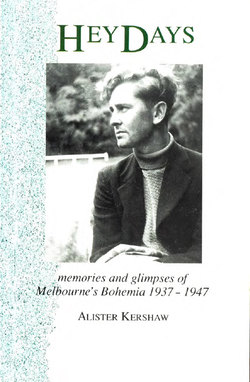Читать книгу Hey Days - Alister Kershaw - Страница 7
На сайте Литреса книга снята с продажи.
INTRODUCTION
ОглавлениеPoor unloved Melbourne! It never got a civil word from us. Its architecture was obnoxious, the climate was inclined to be peevish, you couldn’t buy a drink after six p.m. (unless you were dining in a restaurant when you could have a high old time right up to eight p.m.), the tiniest deviation from conformity in the way you dressed earned you some very dirty looks, and we writers and painters and composers weren’t treated with the respect we deserved. If the place didn’t pull itself together, we told each other, one of these days we’d up-anchor and go somewhere where we’d be appreciated and Melbourne would just have to try to get on without us.
Well, some of our complaints were justified—no question of that; and some weren’t. The drinking hours might have been a bit hard to take but later on some of us would find that, at any rate, the beer (when you could get to it) beat the stuff they served in London and Paris by miles. The shortcomings of the architecture could be matched in any other city. And compared to what went on in Europe, the climate was that of a tropic isle. Maybe artists weren’t looked upon with holy dread (we never asked ourselves why the hell they should be) but at least they were left alone. By the public, that is. Now and again, some artist of the old school would reach the end of his tether and start mumbling about decadence and incompetence and fraud and we avant-garde kids occasionally roughed each other up a bit; but that was as far as it went. In Paris, the rival schools practically used knuckle-dusters on each other. French artists spent more time warding off attacks from the enemy camp than they did actually painting or writing.
When you came down to it, the official censorship in Melbourne (and everywhere else in Australia unless Norfolk Island had been overlooked) was the worst we had to contend with. That was plenty, however. We weren’t allowed to read anything more sexually stimulating than Winnie-the-Pooh and writers were all but forbidden to use any word that began with F.
But the truth is that Melbourne, on the whole, was a pretty good spot and in my dotage I look back on it with an affection I was too brash to experience at the time. And it did, after all, harbour some blithe spirits who would have made any city worth living in: the fabulous (and I could add a dozen other adjectives and still not convey his unique character) Adrian Lawlor; the ebullient Max Harris; the tempestuous Denison Deasey; David Strachan, combining a luminous poetic vision with a splendidly scatological vocabulary; Albert Tucker, ·the only intellectual with any brains; and quite a few more. It had its Rogues’ Gallery too, to my way of thinking: the heresy-hunting Noel Counihan, the schoolmasterly John Reed—but they’ll all be cropping up in due course.
These are some of the people I’ve tried to recall in this book. If you find it heavy going, it’s my fault, not theirs.
Alister Kershaw
1991
